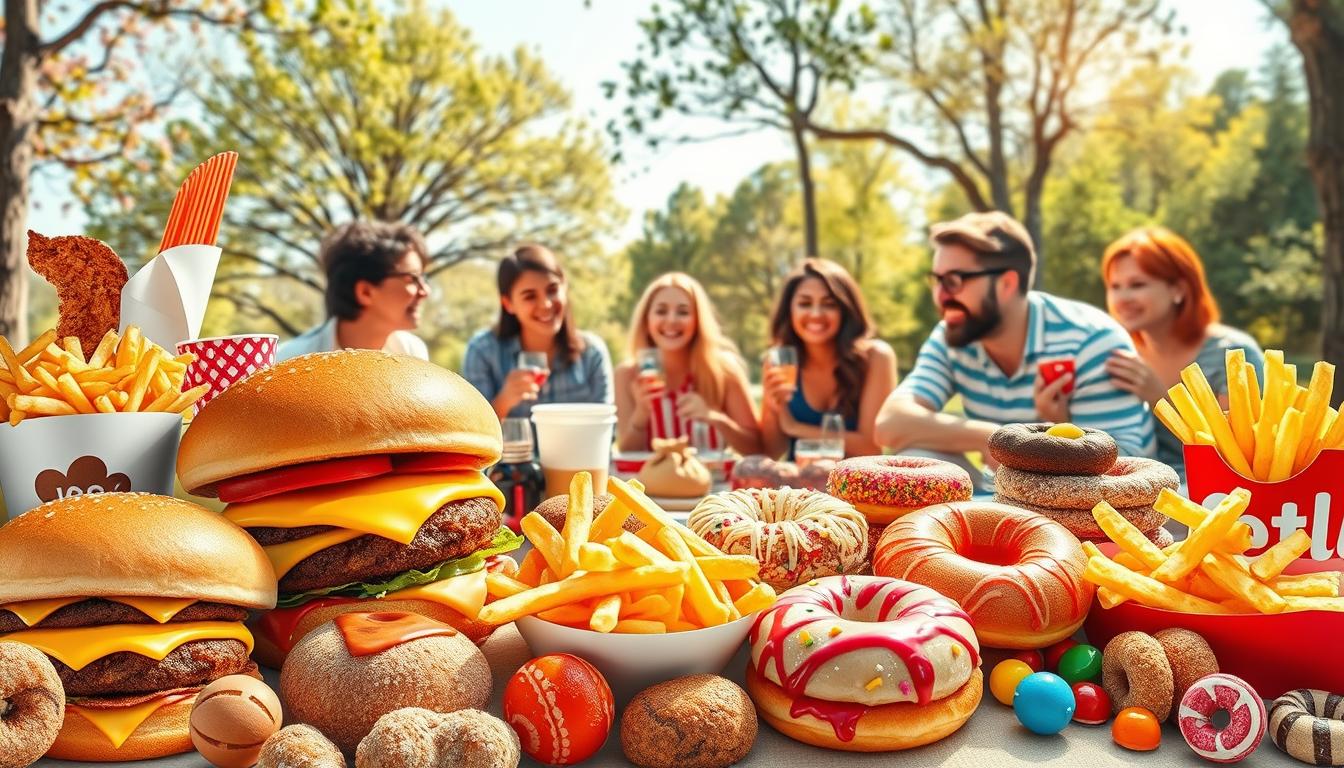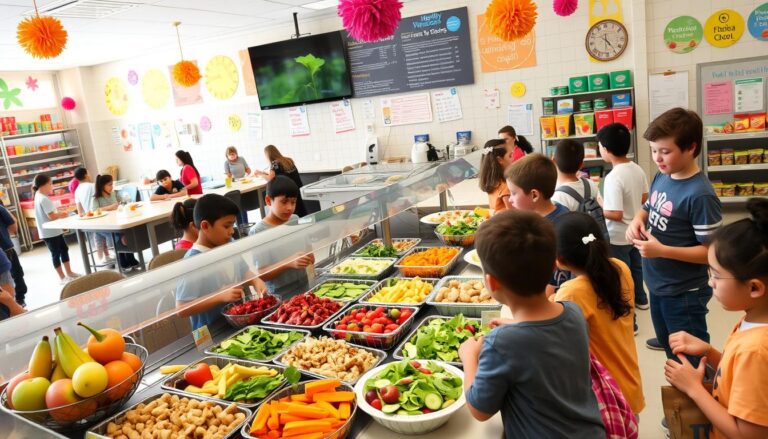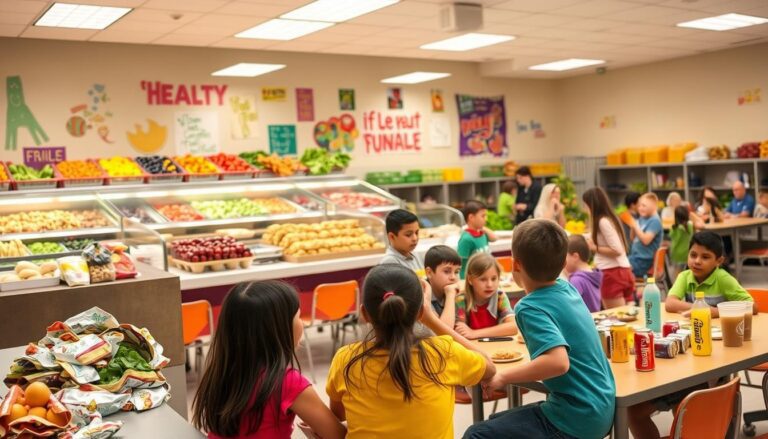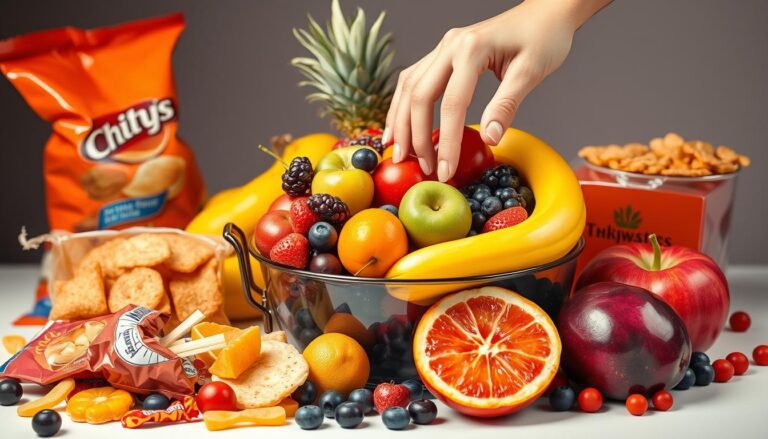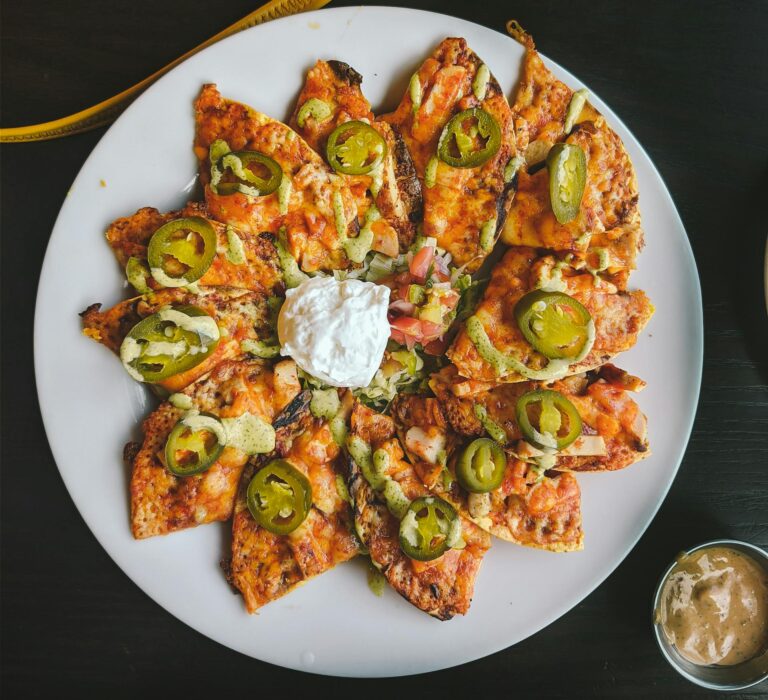Why Junk Food Shouldn’t Be Banned Essay: A Thought-Provoking Perspective
The debate on junk food rules brings up big questions. It’s about our right to choose, taking care of our health, and how it affects our community. Some say we should ban junk food, like in school vending machines, to keep students healthy. But! We must also think about how this could limit our freedom and the jobs in the junk food industry.
Looking at junk food’s role in our society helps us see why we shouldn’t ban it. It’s about making smart choices, not just following rules. By delving deeper, we can find a way to encourage healthy eating without taking away our freedom.
And of course, every topic is complex and there isn’t always a clear black and white answer. There are always trade-offs and points and counter-points. So it may be you come away with agreement on some points but not others.. and that’s okay. The goal is to broaden your thinking so you consider all angles of the issue — including some you might have overlooked — so that you can form an educated, well-reasoned opinion.
(And hey, if you wanna chow down on a donut while reading this, then there’s no judgment!)
Key Takeaways
- Many students strongly advocate banning junk food from school cafeterias.
- The balance between healthy eating and personal freedom remains a contentious issue.
- A significant number of schools have taken steps to restrict junk food availability.
- Understanding the impact of junk food can guide better health decisions.
- Empowering consumer choice can lead to a healthier society without outright bans.
- Educational efforts can better address health concerns linked to junk food.
Understanding the Concept of Junk Food
Junk food is low in nutrients but high in sugars, fats, and salt. It’s important to know about junk food to tackle its role in schools. Schools play a big part in what kids eat, shaping their eating habits. Knowing what junk food is helps parents and teachers make better choices… not to mention the kids themselves!
Defining Junk Food: What Makes It ‘Junk’?
Junk food has too much of bad stuff and not enough good stuff. It can lead to unhealthy eating habits. In schools, junk food is a big worry because it affects how kids see food. Junk food is known for:
- High sugar content
- Excessive fats and oils
- High levels of salt
- Minimal or no nutritional benefits
Types of Junk Food: Categories and Examples
Junk food falls into different groups. Knowing these categories helps parents and teachers choose better options.
| Category | Examples |
|---|---|
| Fast Food | Burgers, fries, pizza |
| Sugary Drinks | Sodas, energy drinks |
| Snack Foods | Potato chips, candy bars |
The debate on junk food in schools is ongoing. Some think banning it is the answer, but it might push kids to eat it outside school. This shows junk food is a complex issue that needs careful thought and solutions.
The Role of Personal Choice in Diet
Personal choice is key in what we eat, showing the need for us to be responsible. Knowing about food helps us make better choices for a healthy diet. Parents should teach kids about junk food’s dangers and offer healthy meals at home.
Empowering Consumer Responsibility
The fast-food industry keeps growing, making junk food more tempting. This is due to clever marketing. It’s up to us to control our food choices.
Knowing junk food’s effects, like energy highs and mood swings, can lead to healthier choices. Learning about junk food’s harm helps us make better decisions.
Balancing Indulgence and Health
It’s important to eat a balanced diet to avoid problems like childhood obesity. While it’s okay to have junk food sometimes, we must do it in moderation. Food delivery apps make unhealthy food too easy to get, leading to bad habits.
Finding a balance with healthy foods and treats can improve our health. It lets us enjoy our favorite foods without harming our health.
Economic Impact of Junk Food Production
The junk food industry is big in the economy, mainly in fast food. It offers quick meals and lots of jobs. But, its real value is in the jobs it creates and the money it brings to local areas.
Jobs Created by the Junk Food Industry
Jobs in junk food are key to its economic role. Fast-food places hire millions, from beginners to bosses. The U.S. has about 275,000 fast-food spots, making $225 billion a year. This shows how important it is for young workers.
The Ripple Effect on Local Economies
Junk food’s impact goes beyond just jobs. It boosts local economies in many ways. Local suppliers and food makers get more business from it. For example, when fast food prices go up, people spend more elsewhere.
This competition pushes companies to invest in their areas. This helps jobs grow and makes the economy stronger.

| Fast-Food Chain | Annual Revenue (in billions) | Number of Employees |
|---|---|---|
| McDonald’s | 46.1 | 1.7 million |
| Starbucks | 26.5 | 350,000 |
| Subway | 15.2 | 415,000 |
| KFC | 23.4 | 800,000 |
| Taco Bell | 12.1 | 210,000 |
The junk food economy is complex and far-reaching. It supports jobs and boosts local economies. This shows how crucial it is to American society.
Cultural Significance of Junk Food
Junk food is a big part of our lives today. It’s found at social events, celebrations, and in our daily meals. It shows how food brings people together, showing its cultural value in many communities.
Think of birthday parties with lots of pizza and cake. Or sports games with nachos and hot dogs. These moments show how food is a big part of who we are and our shared experiences.
Junk Food in Modern Society
Junk food is more than just food; it’s a part of our culture. It shows the different ways people eat in their communities. Foods like tacos, doughnuts, and big burgers are loved for their taste and cultural meaning.
These foods help people connect and share their heritage. They let us explore the tastes that come from our neighborhoods and families.
Celebrating Diversity in Eating Habits
Diversity in food is celebrated, not just accepted. Junk food brings comfort, nostalgia, and a sense of belonging. Families in the U.S. often come together for meals, with junk food playing a big role.
These meals create lasting memories. For example, the love for fried chicken, deep-dish pizza, or doughnuts shows the variety of American tastes. Offering many food options helps build community and welcomes everyone.
The Relationship Between Regulation and Freedom
When we talk about junk food rules, we often think about health and freedom. Rules aim to keep us safe from bad food choices. But, they can also limit our personal freedom. This makes us wonder how much the government should control what we eat.
Striking a Balance: Health vs. Freedom
Many believe that junk food rules shouldn’t take away our freedom. They say we should be able to choose what we eat. This is important because many adults in the U.S. are overweight or obese.
Knowing this, people want options that are healthy but still let them make their own choices. This balance is key to keeping everyone happy and healthy.
- Melissa Abramotivs, the author of “Obesity,” highlights that more than fifty million Americans exceed their ideal weight by over one fifth.
- Studies show that nine out of twenty adult women, along with one out of four adult men, are actively pursuing weight loss.
What the government says about food can change how we see it. Some say putting calorie counts on menus helps us make better choices. But, others argue that this is too much government control.
Government’s Role in Dietary Choices
Even though rules on junk food are meant to help us stay healthy, some question if they really work. Some experts say that health problems are not always because of bad food choices. They think we should focus on changing our behavior instead.
The debate over government rules, like the one in New York City about big sugary drinks, shows a big point. While rules might help us eat better, they can also limit our freedom. This is something we need to think about carefully.
| Statistic | Figure |
|---|---|
| Adults classified as overweight or obese | Over 66% |
| Women actively trying to lose weight | 45% |
| Men actively trying to lose weight | 25% |
Nutritional Education Over Prohibition
Teaching kids about nutrition is better than banning junk food. It helps them make smart food choices. Schools are key in this effort, teaching kids about healthy eating.
This can fight childhood obesity, which could hit two-thirds of kids by the mid-21st century. If we don’t act, the problem will only get worse.
Focusing on Awareness Not Bans
It’s important to teach kids about food’s nutritional value. In the last 30 years, kids’ diets have gotten worse. Parents often buy unhealthy food, even though they know better.
A 2018 study by the University of Connecticut showed 74% of parents choose unhealthy foods when eating out. Teaching kids about nutrition can help them make better choices.
Advocating for Healthier Alternatives
Offering healthy food in schools is a good way to teach kids about nutrition. It helps them make better food choices. Schools can make healthy food appealing, improving kids’ health and grades.
By teaching kids to choose fruits and veggies, we can help them make better choices. This can improve their health and well-being for years to come.

| Key Statistics | Implications |
|---|---|
| Two-thirds of children projected to be overweight or obese by 2050 | Need for comprehensive nutrition education |
| 74% of parents purchase unhealthy restaurant foods | Emphasis on parental awareness and education |
| 1 in 3 children and teens are overweight or obese | Urgent action required to combat obesity crisis |
| Healthy school lunches linked to better academic performance | Benefits of integrating nutrition education in schools |
| Statistics of childhood obesity surpassing drug abuse concerns | Highlighting the need for targeted nutritional programs |
Addressing Health Concerns Without Bans
It’s possible to eat healthier while still enjoying junk food. We need good strategies for eating well in a world where fast food is easy to find. Teaching kids and adults about moderation helps them make smart food choices.
Strategies for Healthier Eating
Schools and communities are key in teaching us what to eat. They can offer healthy food and teach about nutrition. Here are some ways to eat better:
- Make healthy food options available in school cafeterias.
- Teach nutrition in school classes.
- Get families to cook with fresh ingredients together.
- Start gardening projects to teach about food.
- Offer healthy snacks at school.
Promoting Moderation through Education
Teaching people about eating in moderation can change how we eat. Parents need to know what’s in the food they buy. Working together, schools and families can teach moderation without banning junk food. Here are some ways to help:
- Host workshops on meal planning and healthy eating.
- Start community programs to teach about junk food risks.
- Use social media for healthy recipes and tips.
- Give parents tools to choose better food at the store.
- Make sure schools choose healthy food vendors over profit.
The Psychological Factors of Eating Habits
Why do people often choose junk food? Comfort foods are a big part of many diets, even more so when we’re stressed. Understanding their impact on our emotional wellbeing is key.
Comfort Foods and Emotional Wellbeing
Many turn to comfort foods, like junk, when they’re stressed or feeling down. This is because these foods can make us feel better for a while. Foods high in sugar and fat release happy chemicals, making us want them again.
The Role of Junk Food in Social Settings
Social eating habits make junk food seem normal. When we eat with friends and family, junk food is often there. It makes us feel included, but it can also harm our health.
Understanding junk food’s psychological side helps us eat better. Mindful eating can help us enjoy meals without overeating.
Conclusion: A Balanced Perspective on Junk Food
We’ve looked at why banning junk food might not be the best idea. Instead, we should help people make better choices. It’s important to see both sides of junk food: its convenience and its health risks.
With diets changing worldwide, knowing how to make good choices is crucial. This knowledge helps us stay healthy and balanced.
Summarizing the Arguments Against a Ban
Junk food might taste good, but it’s not good for us in the long run. Studies show it can lead to obesity and diseases, mainly in kids. But banning it isn’t the only answer! Instead of resorting to banning it outright, teaching people about nutrition is potentially a better solution.
This way, we can help people make healthier choices. After all, it’s all about being informed and taking care of our health.
Encouraging Informed Choices Over Restrictions
Creating a culture of mindful eating is essential. We should encourage people to think about their food choices. This lets them enjoy treats now and then while staying healthy.
By focusing on education and healthy options, we can teach a new generation about balanced eating. This approach avoids strict rules and promotes a healthier diet for everyone.

